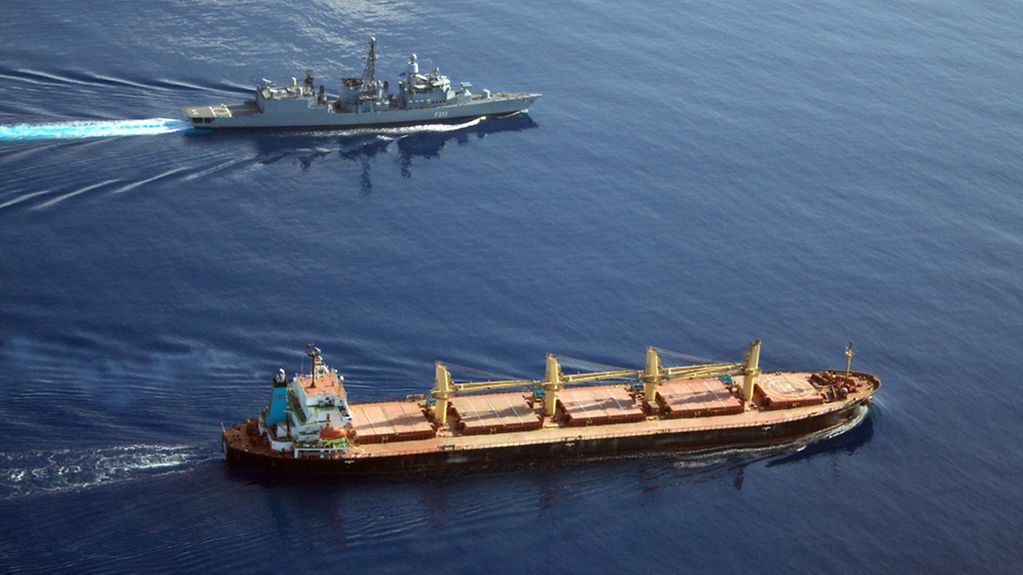EU’s Operation Atalanta
The Bundeswehr is to continue to support the EU’s successful Operation Atalanta. The German Bundestag has approved the extension of the mission.
4 min reading time

The Bundeswehr will continue to escort ships carrying goods for the World Food Programme around the Horn of Africa
Photo: Bundeswehr/Bender
At least partly because of the presence of international troops in the region, no ships have been seized by pirates for four years now. In the waters off the coast of Somalia only up to 600 troops will be deployed in future, as compared to the ceiling of 950 that has hitherto applied.
The Bundeswehr’s anti-piracy mission around the Horn of Africa has been extended until 31 May 2017 with the approval of the German Bundestag.
The Bundeswehr has been part of Operation Atalanta since 2008, and has provided ships, boats and aircraft. Currently, a P-3C "Orion" maritime patrol aircraft is deployed, along with the frigate "Bayern". A total of 313 Bundeswehr soldiers are assigned to Operation Atalanta.
Operation Atalanta’s main mandate will continue to be to combat piracy. Ships carrying supplies for the World Food Programme will also be protected.
The legal basis for the mission is the 1982 United Nations Convention on the Law of the Sea and the mandate of the United Nations Security Council as laid out in Resolution 2246 (2015) adopted on 10 November 2015. These are complemented by the European Council Decision 2014/827/CFSP of 21 November 2014.
Successful mission
It is now four years since the last merchant ship was attacked and seized by pirates in the waters around the Horn of Africa, thanks to the permanent presence of international maritime forces in the region. The measures taken by the industry to protect itself and the use of private armed security teams on board merchant vessels have also helped.
In the past criminal networks on land were responsible for the attacks. These structures remain intact and are still a threat to the shipping channels around the Horn of Africa. The presence of international maritime forces is thus still considered to be necessary by both the European Union and the United Nations Security Council.
Number of troops to be reduced
Last year for the first time the EU reviewed the strategic approach of the mission – also in response to a proposal of the German government. The European External Action Service presented its report to member states at the start of January 2016.
On the basis of this report, member states agreed to extend Operation Atalanta, reduce troop numbers and bring them into line with fluctuations in the threat posed by piracy. Capacities to protect ships carrying cargoes for the UN World Food Programme will, however, be retained in full.
Germany is now responding with the draft mandate, which would strongly reduce the ceiling on troops accordingly.
German forces may take action against the logistical facilities of pirates on the beaches up to a distance of 2,000 metres from the coast. They are not deployed on land to this end.
Building rule-of-law structures
To keep shipping channels open in the long term, what is most needed is to build on the still modest but visible progress made in establishing rule-of-law structures in Somalia. This will also include building security authorities on land and at sea.
The overarching goal remains to enable the Somali authorities to exercise independent control over all of Somali territory including its coastal waters. To this end the EU is providing three important missions within the framework of its Common Security and Defence Policy (CSDP).
Alongside the military Operation Atalanta, there is a military training and advisory mission. The European Union Training Mission in Somalia is training Somali soldiers. Parallel to this, the civilian EUCAP Nestor mission is operating. Somalia and its neighbouring countries are to put in place effective agencies to monitor and control their own coasts independently. Germany is involved in all three missions within the scope of the EU’s Common Security and Defence Policy. The aim is to enable the people of Somalia to generate an income in ways that do not involve piracy.
Development assistance
Apart from military missions, Germany is involved in civilian activities to stabilise Somalia. The focus of the Federal Foreign Office’s stabilisation projects this year in Somalia are to put in place and develop a federal order, to promote democracy and to reform the security sector.
German development cooperation, with its structural and long-term approach, is also making a considerable contribution to bringing peace and development to Somalia. It thus complements Germany’s security and foreign policy engagement in Somalia.
Since 2012 the German government has pledged new funding for bilateral development cooperation totalling 20 million euros. To this sum must be added funds pledged in the 1980s that come to almost 95 million euros.
At the start of 2016, GIZ, which implements Germany’s official technical cooperation, opened a new office in Somalia. Initial projects and programmes are planned in the fields of urban water supply and food security.